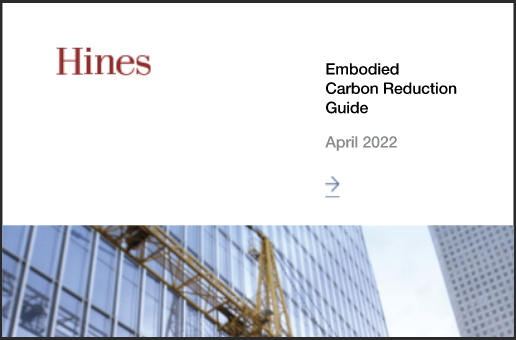Real estate management and investment firm Hines has released the Hines Embodied Carbon Reduction Guide.
The free guide, produced with Magnusson Klemencic Associates (MKA), is the result of a two-year effort, relying on MKA’s industry-leading knowledge of carbon accounting and involvement in programs such as the Embodied Carbon in Construction Calculator (EC3) Tool, according to a news release.
The “108-page program aims to create more sustainable development practices at Hines while establishing an industry standard for quantifying, tracking, and reducing embodied carbon in the commercial real estate development process,” the release says.
“By sharing the Embodied Carbon Reduction Guide with developers, engineers, contractors, material suppliers, investors, and other industry partners, Hines and MKA aim to affect lasting, responsible, and sustainable progress toward reducing the built environment’s carbon footprint,” the release says.
In a related developed, Hines says that its Salesforce Tower Chicago project, a 60-story, 1.2 million-sf office tower recently topped out. The firm says it is the first building to achieve a 19% overall reduction in carbon emissions by using the guide. Nineteen percent equates to a total verifiable structure carbon savings of over 7 million kilograms of C02, which equates to taking more than 1,500 cars off of the road for a year.
Related Stories
Resiliency | Sep 3, 2024
Phius introduces retrofit standard for more resilient buildings
Phius recently released, REVIVE 2024, a retrofit standard for more resilient buildings. The standard focuses on resilience against grid outages by ensuring structures remain habitable for at least a week during extreme weather events.
Adaptive Reuse | Aug 28, 2024
Cities in Washington State will offer tax breaks for office-to-residential conversions
A law passed earlier this year by the Washington State Legislature allows developers to defer sales and use taxes if they convert existing structures, including office buildings, into affordable housing.
Adaptive Reuse | Aug 22, 2024
6 key fire and life safety considerations for office-to-residential conversions
Office-to-residential conversions may be fraught with fire and life safety challenges, from egress requirements to fire protection system gaps. Here are six important considerations to consider.
Building Materials | Aug 19, 2024
Federal 'buy clean' construction materials label program unveiled
The U.S. Environmental Protection Agency announced a plan for implementing a new label program to boost American production of more climate-friendly construction materials and products. The label program will prioritize steel, glass, asphalt and concrete.
Reconstruction & Renovation | Aug 19, 2024
Movement to protect historic buildings raises sharp criticism
While the movement to preserve historic buildings has widespread support, it also has some sharp critics with well-funded opposition groups springing up in recent years. Some opponents are linked to the Stand Together Foundation, founded and bankrolled by the Koch family’s conservative philanthropic organization, according to a column in Governing magazine.
Government Buildings | Aug 19, 2024
GSA posts new RFI for enabling energy efficiency, decarbonization in commercial buildings
The U.S. General Services Administration (GSA), in collaboration with the U.S. Department of Energy, recently released a new Request For Information (RFI) focused on enabling energy efficiency and decarbonization in commercial buildings. GSA wants to test innovative technologies through GSA’s Center for Emerging Building Technologies.
Urban Planning | Aug 15, 2024
New York City begins first large-scale porous pavement installation
New York City is installing its first large-scale porous pavement installation along seven miles of roadway in Brooklyn. The project will keep 35 million gallons of stormwater out of the combined sewer system each year, according to a news release.
Government Buildings | Aug 14, 2024
GSA releases updated standards to move federal buildings toward zero emissions
The U.S. General Services Administration (GSA) recently released updated building efficiency standards for federal buildings. The mandatory design and construction standards and performance criteria apply to 300,000 federal buildings.
MFPRO+ News | Aug 14, 2024
Report outlines how Atlanta can collaborate with private sector to spur more housing construction
A report by an Urban Land Institute’s Advisory Services panel, commissioned by the city’s housing authority, Atlanta Housing (AH), offered ways the city could collaborate with developers to spur more housing construction.
Energy Efficiency | Aug 9, 2024
Artificial intelligence could help reduce energy consumption by as much as 40% by 2050
Artificial intelligence could help U.S. buildings to significantly reduce energy consumption and carbon emissions, according to a paper by researchers at the Lawrence Berkeley National Laboratory.

















